David Cameron will risk the wrath of the drinks industry and free marketeers today by announcing his government is to introduce legislation setting a minimum alcohol price of 40p a unit in England – enough to add £135 to the annual bill of a heavy drinker.
In what is regarded as the biggest public health intervention since the Labour government's smoking ban, Cameron will also ban the sale of multi-buy discount deals in supermarkets. He is aware the policy may prove deeply unpopular, but thinks it will chime with those demanding greater social order.
The alcohol strategy follows months of Whitehall infighting over the legality, effectiveness and politics of imposing a minimum price. The aim is to introduce legislation in autumn after a summer consultation, with the minimum price coming into force in 2014.
It remains unclear how the ban on discount deals would work in practice. But Guardian analysis suggests the government's proposed minimum price alone would substantially curtail many of the high-profile drinks deals promoted by major supermarkets. Data provided by the research company Assosia, covering promotions between December and February this year, shows Tesco and Sainsbury's offered two-for-£20 deals on 20-pack crates of Strongbow cider – a sale of more than 93 units of alcohol, working out at just 21p per unit.
At 40p a unit, the two packs would have to cost a minimum of £37.30.
A deal offering 20 cans of Stella Artois – 44 units of alcohol – for £10 at Asda would become substantially more expensive, with a minimum price of £17.60.
Cameron, instinctively opposed to such state intervention, has been persuaded by evidence of crime and health experts on the damaging social impact of alcoholism, especially among young people. He has overriden objections from the health secretary, Andrew Lansley. The 40p a unit minimum price could mean 50,000 fewer crimes each year and 9,000 fewer alcohol related deaths over the next decade, the government claims.
Downing Street denied publication of the strategy had been brought forward from next Monday after the hostile reception to George Osborne's "budget for millionaires". Cameron is said to be phlegmatic about the media response, especially to changes to tax allowances for pensioners, and thinks the public will welcome the package as a whole. Government sources insisted the alcohol strategy had always been in the grid for the day after the budget.
Cameron will promise an attack on the country's binge culture from every angle, including "more powers for pubs to stop serving alcohol to people who are already drunk, more powers for hospitals not just to tackle the drunks turning up in A&E – but also the problem clubs that send them there night after night".
He is also to press ahead with proposals requiring clubs and pubs to pay a levy to the police to cover the cost of alcohol-related disorder.
The government says the cost of the minimum price for the average drinker will be just £21-£23 a year. For moderate drinkers (drinking within recommended limits of up to 21 units a week for men and 14 units for women) the cost will be only £5-£6 a year. Heavy drinkers (drinking far above the recommended limit – more than 50 units a week for men and 35 for women) face a cost of between £105-£135 a year.
Lansley, unlike the home secretary, Theresa May, had been opposed to a minimum price and has pointed out that it had not been tried elsewhere. He had supported a ban on below-cost selling instead, but Cameron overruled the health secretary. Cameron will consult on his figure of 40p, but acknowledges that the drinks industry, following the example of the tobacco industry, is certain to challenge his move at the European court of justice under EU competition laws. Government ministers have expressed public scepticism that they can win such a case.
The government can defend itself on the basis that the action is proportionate in view of the damage to the nation's health caused by binge drinking.
Some dominant supermarkets, such as Tesco will welcome the move, but smaller stores that compete on price will suffer. Producers of cider and cheap, own-brand beers will lose out from the move.
The government says a 40p unit price will not add to the price of beer in a pub and might even help the pub trade by eradicating the cheap supermarket alternative.
In other examples of the impact, a deal offering 20 cans of Carling lager at Sainsbury's would jump to £14.50, due to its lower alcohol content.
A deal at the Co-operative on six bottles of Bulmers cider would increase from £3.50 to a minimum price of £6.13. Wine drinkers would also be impacted, as offers like Asda's longstanding 3-for-£10 deal on wine would become suitable solely for wines with an alcohol content of 11% or below – a little below the average for the UK palate, as consumers tend to prefer the sweetness that comes with a slightly higher alcohol content.
Ministers claim the policy will not lead to higher supermarket profits since they will be expected to put any extra profits they make towards lowering the price of other goods.
Cameron will say: "Binge drinking isn't some fringe issue, it accounts for half of all alcohol consumed in this country. The crime and violence it causes drains resources in our hospitals, generates mayhem on our streets and spreads fear in our communities.
"My message is simple. We can't go on like this. We have to tackle the scourge of violence caused by binge drinking. And we have to do it now.
"When beer is cheaper than water, it's just too easy for people to get drunk on cheap alcohol at home before they even set foot in the pub. So we are going to introduce a new minimum unit price – so for the first time it will be illegal for shops to sell alcohol for less than this set price per unit."
One unit is 10ml of pure alcohol, equivalent to a measure of whisky, just over a third of a pint of beer or half a glass of wine.
Cameron will say: "This isn't about stopping responsible drinking, adding burdens on business or some new stealth tax – it's about fast immediate action where universal change is needed.
"Of course, I know this won't be universally popular. But the responsibility of being in government isn't always about doing the popular thing. It's about doing the right thing."
Chief Constable Jon Stoddart, Association of Chief Police Officers lead on alcohol, welcomed the move. "The growing trend for 'pre-loading' means that young people are often drunk before they even enter a bar," he said. "By the time they hit the streets at closing they are more likely to get involved in crime and disorder."
Academics at the University of Sheffield, who have led research on the issue, estimate a minimum price of 45p a unit coupled with an off-trade discount ban already in place would reduce annual hospital admissions by 1,660 in the first year, rising to 6,630 a year after a decade, and cut the number of deaths by 60 in the first year, rising to 300 by year 10 of the policy.Lansley has previously ridiculed the policy as absurd, saying: "Are we really saying that because a bottle of vodka isn't £8 but £12.50 they are not going to preload with a bottle of vodka for a night out when they are in clubs where they pay £5 for a drink?"
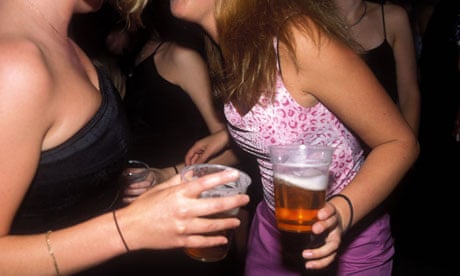
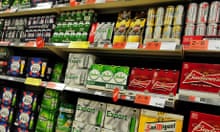
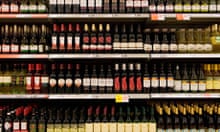

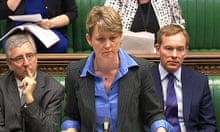

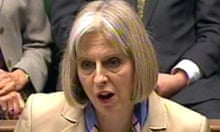
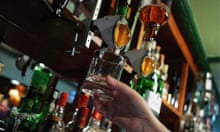
Comments (…)
Sign in or create your Guardian account to join the discussion